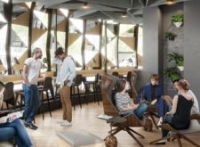As workforces continue to evolve and technology continues to unlock new ways of working, the places where we choose to work are also constantly changing. Almost regardless of sector, companies are embracing the notion of adapting their operations and processes to suit the needs of their team in order to maximise efficiency and, ultimately, increase profit.
It is this flexibility that has played a key role in how employers have made themselves more attractive in an increasingly competitive market to snap up - and keep - the right talent.
In fact, a YouGov survey conducted last year found four in ten (42%) UK adults work flexibly and for 61% of us a ‘good job' constitutes having the ‘flexibility to work the hours and patterns that suit them'.
Companies need to therefore adapt to ensure maximum collaboration - even when staff are working out of different locations. But, why is flexibility the cornerstone of the success of many businesses, irrespective of size or sector? The trend is largely down to our ongoing quest to maintain a work/life balance.
Employees want to see their workspace as more than somewhere to clock in, do their shift and leave. Instead, offices are now much more than that - they are a place for networking, collaboration between like-minded companies, with a social and, increasingly, a community feel at their core.
Property company Bruntwood Works has been at the forefront of this trend for many years and is continually driven by creating working environments that offer a workspace to suit the task at hand, as well as promoting wellbeing, collaboration, and community. For example, its recently launched £50m Pioneer refurbishment scheme is centred on giving a selection of Bruntwood Works buildings across the North and Midlands a brand new look.
The scheme includes additional flexible workspace solutions, such as innovative spaces including podcast booths, rooftop gardens, sleep pods and collaboration hubs, all designed to drive creativity. Pioneer buildings will also offer health and wellbeing facilities such as gyms and cycle storage, as well as retail spaces.
Importantly, each building included in the programme will have its individual personality showcased throughout its design, creating a key landmark. For instance, Manchester's Blackfriars House will have a 1920s theme as a nod to its rich heritage as well as a rooftop garden and restaurant. Nearby 111 Piccadilly, with its planned 200ft exterior innovative lighting installation powered by advanced photovoltaics and Platinum WELL accreditation, is set to become Manchester's smartest new workspace.
But, these changes are about more than creating an aesthetically pleasing space. In fact, significant improvements to communal areas and additional shared facilities, can encourage collaboration and step up innovation, according to Bruntwood Works CEO Ciara Keeling.
She said: "We're extremely passionate about creating a sense of community and facilitating collaborative thinking between like-minded businesses. The changes to our Pioneer buildings strengthen this ethos.
"Having shared facilities and amenities at your fingertips shouldn't be exclusive to larger corporates, so smaller businesses can take a coworking desk in one our buildings but still benefit from the full mix of areas. We're passionate about businesses growing with us and being part of their journey, therefore giving them tools for collaboration from the outset is essential."
As our workforce continues to evolve and the lines between some sectors and, indeed, work environments, become blurred, it is clear that companies need to embrace the notion of flexibility as they progress in their journey.







